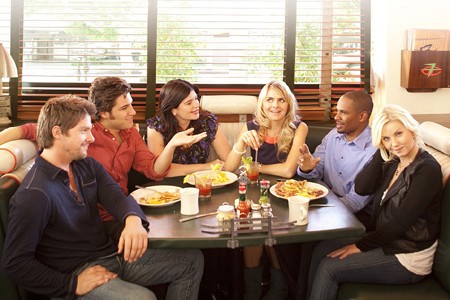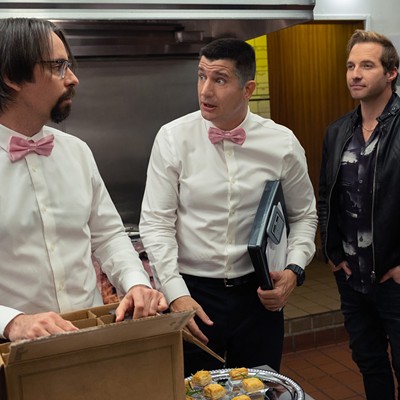Wednesday, June 1, 2011
We like sitcom characters who like each other
Great drama is often about the collapse of relationships. But great comedy is usually about the opposite — it’s about the strengthening of relationships.
We want to see an arc in our dramas. We want to see people betray each other, lose what they have, and sacrifice their souls for their goals. Great drama is often painful to watch.
But comedy has a different goal: Drama goes for the brain, comedy goes for the heart. In other words, if you don’t enjoy comedy, if you don’t find it funny, then, almost by definition, the comedy has failed.
Which is why it’s usually so crucial that the characters on a sitcom show that they like each other.
The traditional three sitcom acts are powered by conflict. A husband forgets his wife’s anniversary, a young man has to juggle two dates at the same dance. Conflict is a necessary framework to drive a story, of course. But while a show without conflict would sag, that’s not really why we watch a sitcom. Even the jokes, honestly, are often secondary. We watch because we enjoy spending time with the characters. And if the characters enjoy spending time with each other, that task is that much easier.
It’s no coincidence that one of the most popular sitcoms of all time boiled down the conceit to a title: FRIENDS.
That’s why overarching plot often gets in the way. Whenever we’re spending time on Friends’ romantic drama or Ted Mosby’s search for a wife on How I Met Your Mother, it distracts from the central focus: just hangin’ out.
Cheers also addressed this specifically. The closeness and camaraderie
even appear in the theme song.
Similarly, when the new and fairly generic sitcom Happy Endings premiered, critics hated it. The central premise — a wedding is interrupted by an ex-boyfriend, the bride runs off with her, and then returns dumped two weeks later — was dopey.
It was lumped in with Perfect Couples, Mad Love, and Traffic Light as sitcom fluff. But when it largely ditched the premise, suddenly critics began enjoying the show. One critic, on Twitter, pointed out a possible reason why: The characters really seemed to like each other. They didn’t tell us that in a monologue, Community-style. They showed it through smiles, quips, and chemistry.
Even in sitcoms with unlikable characters, where the entire rest of the universe despises the characters involved, it’s crucial that the characters appreciate the others in the group. Even the sociopaths in It's Always Sunny in Philadelphia often band together in gleeful schemes, in their own twisted form of camaraderie. Even as they rolled their eyes at the other characters’ quirks and idiosyncrasies, Seinfeld’s characters appreciated — or at least were amused by — each other. This tells us that we should find the other characters’ irritating traits tolerable, even charming.
For an example of what happens when you abandon the characters-like-each-other conceit, we turn to show runner Chuck Lorre.
Lorre is the master of the sitcom, if you define “master” as “good at making lots of money.” He used to be a writer for Roseanne. And he’s the one behind The Big Bang Theory and Two and a Half Men, two of the biggest moneymakers on television.
But all of his sitcoms are fueled by insults, instead of likability. Sheldon, Leonard, Raj, and Howard express contempt for one another and, eventually, their personalities become all the more grating to the regular viewer. A Lorre show may have some decent punchlines, but it generally leaves a bitter, almost metallic, aftertaste.
Linda Holmes, with NPR, highlighted a key problem with the slightly weaker second season of Modern Family: The gay couple, Cameron and Mitchell, had plenty of fights, but never really appeared to genuinely like each other. As a result, their scenes begin to become bothersome, nagging, even irritating.
There are great sitcoms that are exceptions to the rule, of course: In Arrested Development, the most critically acclaimed sitcom in recent history, the affection between the characters mostly came across as ironic. The main character loved his family, but that love came more out of exasperated duty than easy chemistry. The Office, and similar comedies of discomfort, began as an exception but generally moved to soften the characters’ frustrations toward each other. Note how Jim told Michael he was a great boss when he was leaving. The short-lived British series could survive on irritation for 14 episodes. There’s no way that would have worked for six seasons.
It’s far more problematic when TV series go the other way. On Community, Pierce Hawthorne (Chevy Chase) rapidly became a problematic character. Not just because he wasn't a likable character, but because the other characters disliked him. Keep tabs on Community as it goes forward. If the characters continue this attitude toward Pierce, a central character, the jokes may remain funny, but it may not be as enjoyable.
We want our Friends to be friends, our Cheers to
be of good cheer, and our Community to have a strong community. Otherwise, we're just left with Everybody Barely Tolerates Raymond and I Pretend to Love Lucy For the Kids.




















